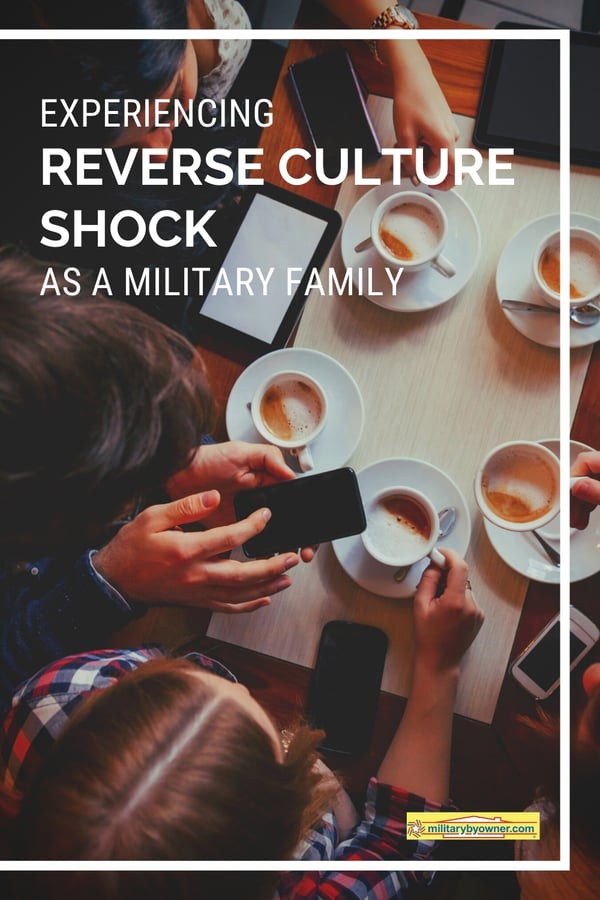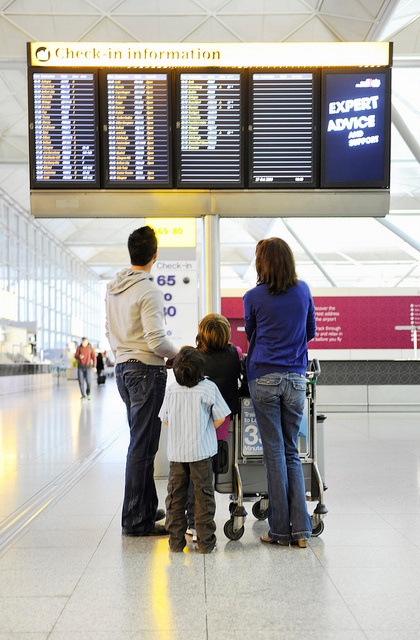Experiencing Reverse Culture Shock as a Military Family
Reverse culture shock is a common experience for anyone who has lived for a time away from their home country. For military families who spend a few years living overseas in places like Germany, Japan, or Guam, it is almost guaranteed.
Reverse culture shock is the awkward experience of seeing your home culture through a foreigner’s eyes. It can be unpleasant, frustrating, or just amusing, depending on the situation.

When our family moved to Spain on military orders, we experienced our first culture shock at the local beach. Spanish beaches are topless beaches. Old people were topless. Little kids were completely nude. We were surprised and uncertain how to react.
During the three years we lived in Spain, we experienced many other culture shocks. Overall, we loved Spain, including the people, the culture, and the food. I even wrote a book about our great experiences. But there were plenty of unfamiliar things that surprised and confused us.
When we returned to America after three years abroad, we thought it would be a relief to come home. Everything would be comfortable and familiar!
But we were immediately confronted with situations that confused and surprised us. Many things had changed while we were gone. We felt like foreigners in our own hometowns.
Reverse Culture Shock Means Relearning Your Own Culture
 Photo by Artem Kovalev on Unsplash
Photo by Artem Kovalev on Unsplash
We had to relearn how to do things in an American way. For weeks, I kept reaching for the top of the toilet to push the flush button, instead of for the handle on the side. Even though I grew up in America, three years in Spain had trained me to flush toilets from the top.
My children, who only remembered life overseas, were completely baffled by all the automatic features in American public bathrooms. I had to teach them how to use automatic soap dispensers and hand dryers, because they had never seen them.
Reverse Culture Shock Can Be Emotionally or Physically Overwhelming
 Photo by Hanson Lu on Unsplash
Photo by Hanson Lu on Unsplash
Some parts of reverse culture shock are fun. The first time I walked into Target after more than three years away, I was giddy with excitement. Overseas, there aren’t many "big box" stores. Small local stores have limited selections and no convenient parking. Shopping can be complicated and time-consuming. In America, having so much selection in one store was mind boggling. I wandered through the aisles, marveling how easy and fun it was. $300 later, I realized I would need a lot more self-control when shopping in America! After a year back in the U.S., I still feel amazed and overwhelmed by the huge selections in stores like Michael’s craft store or even a CVS pharmacy.
Other times, reverse culture shock is unpleasant. Technology presented the biggest surprise. When we left for Europe in 2012, we had basic smart phones, with a free upgrade every few years. In Europe, I became used to a basic flip phone with no camera or Internet. I almost never used it, so it cost 10 Euros per month ($12). Imagine our shock when we returned to America and learned that our carrier no longer offered free upgrades. A basic smart phone would cost $500! Our monthly cell phone bill would be over $200. Standing in the store adjusting our budget, I felt physically sick, dizzy, and disoriented.
Reverse Culture Shock Changes You Permanently
The best way to describe reverse culture shock is the image of the square peg in a round hole. If your native culture is like a circle, then a foreign country’s culture will be like a square. There will be edges and corners of the foreign culture that never become easy to you. They simply don’t fit with the way you grew up.
For example, we never quite adjusted to the Spanish restaurants, which don’t open for dinner until after 8 p.m.! When you return to America, your own native culture, you will be surprised that you have changed.
You are no longer the smooth circle you were when you were growing up. You see things through new eyes. But you are not fully square (foreign), either. You have become something new. You have become...a star. For the rest of your life, you will not quite fit in as an American. There will be situations where you view America as an outsider.
When You View America as a Foreigner
The downside of reverse culture shock is that you can feel alone and disconnected, especially if you don’t know anyone else who has visited the country where you lived. You become more aware of American shortcomings, like the amount of time we all spend on the Internet or our phones, or how many "First World Problems" Americans complain about.
We are used to convenience and options that don’t exist in many parts of the world. Life is fast-paced, and not very family oriented. It's painful to realize the inherent flaws in your own native culture.
 Photo by Flickr Highways England
Photo by Flickr Highways England
Yet, reverse culture shock has a positive side, too. Living outside of your country will make you fiercely patriotic. I never take our flag for granted, and I am still moved to tears when I hear the Pledge of Allegiance. Reverse culture shock can also help you realize how much you have grown and changed from your experiences.
Adjusting to life overseas was a huge challenge, and the experience made me stronger, more confident, and more independent than ever before. Now, most things in America seem easy by comparison. Car trouble? No problem; at least I can contact the repair shop in my native language! Moving again? Great, I love exploring new areas! Husband deploying? That’s ok; I know I can get by on my own.
Returning to America has been an adjustment, our second hardest PCS move. But the time overseas was worth it. Every experience of reverse culture shock makes me proud, because it is simply a reminder that we are stars.
Have you lived overseas? What was one thing that surprised you when you returned?
If you're moving overseas, be sure to download our free guide below!





